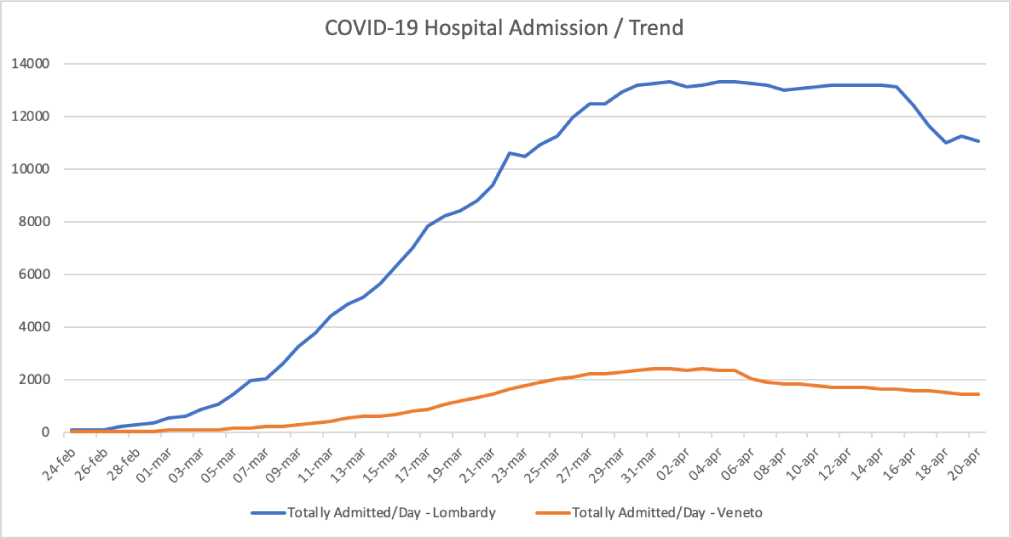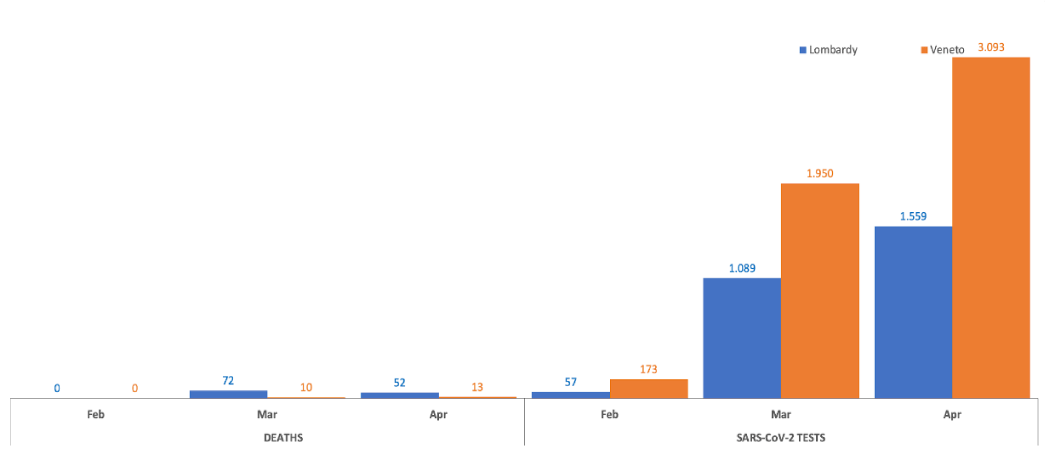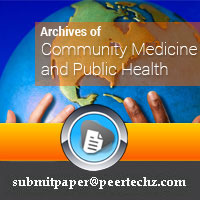Archives of Community Medicine and Public Health
So close yet so distant: evidence from Lombardy and Veneto to plan COVID-19 recovery strategy
Silvia Ussai1*, Marzia Calvi1, Benedetta Armocida2, Beatrice Formenti1, Francesca Palestra1 and Eduardo Missoni1,3
2Institute for Maternal and Child Health - IRCCS “Burlo Garofolo” - Trieste, Italy
3Centre for Research on Health and Social Care Management, Bocconi University, Milano, Italy
Cite this as
Ussai S, Calvi M, Armocida B, Formenti B, Palestra F, et al (2020) So close yet so distant: evidence from Lombardy and Veneto to plan COVID-19 recovery strategy. Arch Community Med Public Health 6(1): 088-090. DOI: 10.17352/2455-5479.000085To the editor
As Italy is approaching a new phase in the response to the COVID-19 epidemic, the analysis of policy choices and their impact offer a useful learning opportunity. Lombardy and Veneto, two neighbouring Regions with comparable socio-economic features, implemented different policies in response to the epidemic, which resulted in divergent outcomes.
These facts should be taken into account in developing the Italian recovery plan and may support the response in other countries.
On 23 February 2020, with the Prime Minister’s Decree n. 648 [1], urgent measures were established to contain the transmission of COVID-19 in Italy, imposing, among others, the creation of quarantined areas, so-called “red-zones”, in Codogno (Lombardy) and Vo’ Euganeo (Veneto), considered the earliest epicentres for SARS-CoV-2 outbreak. People were not allowed to enter or leave those zones nor move between Regions.
On March 11 2020, a new governmental Decree, known as “Resta a casa” (Stay at home) [2], established a lockdown in the entire national territory.
Since then, given the regional autonomy provided within the Italian National Healthcare Service (SSN) [3], Lombardy and Veneto regional authorities adopted different public health prevention and control strategies to their Regions.
Lombardy, the most prosperous Region in Italy, experienced the country’s highest burden from COVID-19.
To date (25 April 2020), Lombardy reported 715 COVID-19 tested cases/ 100,000 population and 132/100,000 population deaths, accounting for 37% and 50% respectively of total cases in Italy.
Veneto recorded 354/100,000 pop. SARS-CoV-2 positives, a number 2-fold lower, and 26/100,000 pop. related deaths [4].
A total of 4.692 COVID-19 cumulative daily cases per 100,000 population required hospitalization in Lombardy, but only 1.388/100,000 pop. in Veneto (Graph 1, 20 April 2020).
Since the first stage of the epidemic, Veneto’s strategic plan has been based on 1) extensive population testing, including asymptomatic and paucisymptomatic cases; 2) a proactive early detection and tracking approach on suspected cases (viral clearance performed to the closest contacts of all COVID-19 confirmed cases); and 3) the operationalization of community-based diagnostics and care, also through “Special Units of Continuous Assistance” (divisions each taking home care of an average population of 50,000).
Lombardy, in contrast, focused on testing mainly the symptomatic cases and invested less in territorial care. The Region has over six times more deaths than Veneto and half of SARS-CoV-2 tests performed (2,705 and 5,216 per 100,000 population respectively) (Graph 2, 20 April 2020).
Lombardy, in contrast, focused on testing mainly the symptomatic cases and invested less in territorial care. The Region has over six times more deaths than Veneto and half of SARS-CoV-2 tests performed (2,705 and 5,216 per 100,000 population respectively) (Graph 2, 20 April 2020).
Since the first stage of the epidemic, Veneto’s strategic plan has been based on 1) extensive population testing, including asymptomatic and paucisymptomatic cases; 2) a proactive early detection and tracking approach on suspected cases (viral clearance performed to the closest contacts of all COVID-19 confirmed cases); and 3) the operationalization of community-based diagnostics and care, also through “Special Units of Continuous Assistance” (divisions each taking home care of an average population of 50,000).
Lombardy, in contrast, focused on testing mainly the symptomatic cases and invested less in territorial care. The Region has over six times more deaths than Veneto and half of SARS-CoV-2 tests performed (2,705 and 5,216 per 100,000 population respectively) (Graph 2, 20 April 2020).
Furthermore, on March 30 2020, Lombardy passed a Regional Deliberation (n. XI / 3018) [5], including guidelines requiring the confinement of COVID-19 positive patients into care homes (Residenza Sanitaria Assistenziale, RSA). Due to unprepared care homes struggling to secure safe lockdown for elderly residents at risk for severe and fatal SARS-CoV-2 infections, the measure resulted in an unprecedented death toll among step-down facilities residents (1.822 to 17 April 2020) [6].
Finally, Veneto has stepped up its effort to support and monitor healthcare workers (HCWs). As of March 30, HCWs accounted for 14.3% of all COVID-19 cases reported in Lombardy, compared with 4.4% in Veneto [7].
Considering the forthcoming recovery “Phase 2” in the fight against the COVID-19 epidemic, with “lock-down” softening expected starting 4 May 2020, there are lessons learnt to catalyze and direct the future action plan, specifically, the need of:
- scaling-up intervention and prevention at community level, where the burden of the epidemic could be effectively mitigated, protecting the hospital system from the overload;
- deploying proactive testing and innovative tracking approaches to improve the health security system, including the leverage of e-health potential, with due ethical considerations;
- enforcing accurate epidemiological surveillance, with serological testing offering additional tools to orient decision-making.
In conclusion, the current COVID-19 epidemic urges to plan for the upcoming recovery strategy, promptly redirect actions, taking advantage from the lessons offered by the comparison of different regional policies, which also suggest the need for a better coordinated national strategy.
Authorship contributions
All persons listed as authors have contributed to preparing the manuscript and their authorship
meets the International Committee of Medical Journal Editors (ICMJE) criteria.
Competing interests
We have read and understood the Journal policy on declaration of interests and have no relevant interests to declare.
- Disposizioni attuative del decreto-legge 23 febbraio 2020. Recante misure urgenti in materia di contenimento e gestione dell'emergenza epidemiologica da COVID-19. Link: https://bit.ly/2yLFrTo
- Ministry of Health of Italy. Covid-19. In Gazzetta ufficiale Serie Generale. Link: https://bit.ly/3gvrXfw
- Armocida B, Formenti B, Ussai S, Palestra F, Missoni E (2020) The Italian health system and the COVID-19 challenge. The Lancet Public Health 5: E253. Link: https://bit.ly/2AjOwn0
- Dipartimento della Protezione Civile COVID-19 Italia - Monitoraggio della situazione. Link: https://bit.ly/2ZS2k2A
- Regione Lombardia. Deliberazione n XI / 3018. seduta del. Link: https://bit.ly/2zJzCX7
- Logar S (2020) Care home facilities as new COVID-19 hotspots: Lombardy Region (Italy) case study. Arch Gerontol Geriatr 89: 104087. Link: https://bit.ly/2XguXVx
- Binkin N, Salmaso S, Michieletto F, Russo F (2020) Protecting our health care workers while protecting our communities during the COVID-19 pandemic: a comparison of approaches and early outcomes in two Italian regions, Italy, 2020. Medrxiv. Link: https://bit.ly/2zBZaFL
Article Alerts
Subscribe to our articles alerts and stay tuned.
 This work is licensed under a Creative Commons Attribution 4.0 International License.
This work is licensed under a Creative Commons Attribution 4.0 International License.



 Save to Mendeley
Save to Mendeley
